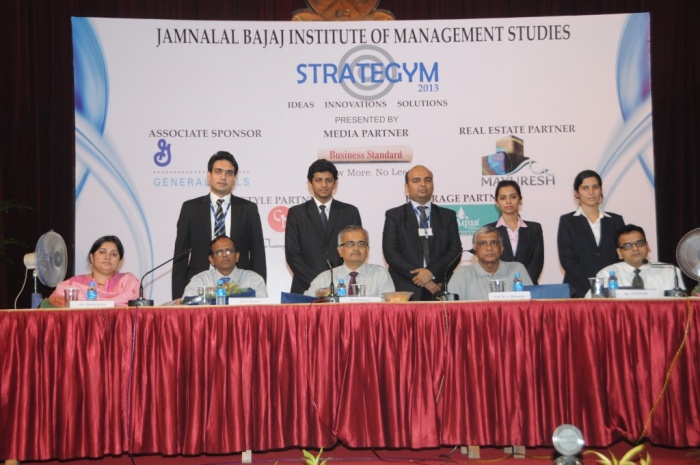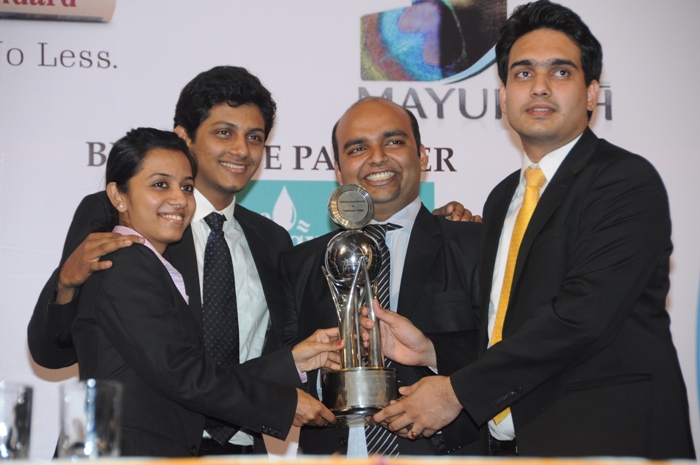An amalgamation of innovation and ideas of the youth with the expertise of the corporates is the essence of Strategym – The Annual Business Convention of Jamnalal Bajaj Institute of Management Studies. This ideology was at display when research papers were presented at Strategym 2013, organized at Convocation Hall, University of Mumbai.
Strategym 2013 was inaugurated by Mr. Shripad Ranade, Senior Principal – Auto & Engineering at Tata Strategic Management Group. A total of five papers were presented by the students that emphasized 'Reforming the Indian Economy- Creating hope for people in times of policy paralysis' the theme for this year. The teams presented research papers in varied fields that offered pragmatic solutions to tackle various socio-economic issues. The teams were judged by experts and eminent panelists from the relevant fields who gave their recommendations and suggestions, to help students further develop their proposals.
Indian Railways is finding it difficult to meet the expectations of a growing economy and the paper “Indian Railways Whistles for a Turnaround”[/b] suggests improvisations in its passenger and freight sections. The paper also comes up with a brand makeover exercise for the Indian Railways.

The dwindling contribution of the agri-sector to the national GDP in spite of it being the source of livelihood for a huge population prompted the students to come up with a model that takes agri-commodity trading to the doorsteps of small farmers through their paper "Extending Secured Nano Credits to Farmers to Foster Rural Entrepreneurship". This model combines commodity futures, crop insurance & logistics to mitigate risks for the farmers.
Through the research paper "Tapping the Potential of Solar Power Pumps in Irrigation" the students evaluated the current energy scenario in India, highlighting the government mechanisms in place to promote solar energy. Further, the paper made a business case for solar power pumps to be used in irrigation.

The paper on ‘Bridging the Urban Rural Healthcare Deficit’, which was awarded the 2nd prize at Strategym’13, worked at unraveling the potential of the Indian healthcare industry by proposing a sustainable, replicable and scalable model with an ultimate goal of universal healthcare.
The winning paper at Strategym this year, ‘Direct Cash Transfer’, performed a critical analysis of the cash transfer system in India, its benefits and shortcomings to both the government and the public for which it is intended. The paper compares the current system with the global best practices and then suggested methods to streamline the entire process.
The panelists and experts congratulated the students of JBIMS for taking up topics of such social relevance and mentioned that the quality of research that was carried out for each paper surpassed their expectations and did full justice to the legacy of the institute. In the past, research papers presented at Strategym have been adopted by companies like UNICEF, UNDP, DHFL and LIC.
Strategym successfully concluded its 17th year since its inception in 1996 with an attempt to positively affect the society and a promise to be back with more of such initiatives and bigger responsibilities next year.
Strategym 2013 was inaugurated by Mr. Shripad Ranade, Senior Principal – Auto & Engineering at Tata Strategic Management Group. A total of five papers were presented by the students that emphasized 'Reforming the Indian Economy- Creating hope for people in times of policy paralysis' the theme for this year. The teams presented research papers in varied fields that offered pragmatic solutions to tackle various socio-economic issues. The teams were judged by experts and eminent panelists from the relevant fields who gave their recommendations and suggestions, to help students further develop their proposals.
Indian Railways is finding it difficult to meet the expectations of a growing economy and the paper “Indian Railways Whistles for a Turnaround”[/b] suggests improvisations in its passenger and freight sections. The paper also comes up with a brand makeover exercise for the Indian Railways.
The dwindling contribution of the agri-sector to the national GDP in spite of it being the source of livelihood for a huge population prompted the students to come up with a model that takes agri-commodity trading to the doorsteps of small farmers through their paper "Extending Secured Nano Credits to Farmers to Foster Rural Entrepreneurship". This model combines commodity futures, crop insurance & logistics to mitigate risks for the farmers.
Through the research paper "Tapping the Potential of Solar Power Pumps in Irrigation" the students evaluated the current energy scenario in India, highlighting the government mechanisms in place to promote solar energy. Further, the paper made a business case for solar power pumps to be used in irrigation.
The paper on ‘Bridging the Urban Rural Healthcare Deficit’, which was awarded the 2nd prize at Strategym’13, worked at unraveling the potential of the Indian healthcare industry by proposing a sustainable, replicable and scalable model with an ultimate goal of universal healthcare.
The winning paper at Strategym this year, ‘Direct Cash Transfer’, performed a critical analysis of the cash transfer system in India, its benefits and shortcomings to both the government and the public for which it is intended. The paper compares the current system with the global best practices and then suggested methods to streamline the entire process.
The panelists and experts congratulated the students of JBIMS for taking up topics of such social relevance and mentioned that the quality of research that was carried out for each paper surpassed their expectations and did full justice to the legacy of the institute. In the past, research papers presented at Strategym have been adopted by companies like UNICEF, UNDP, DHFL and LIC.
Strategym successfully concluded its 17th year since its inception in 1996 with an attempt to positively affect the society and a promise to be back with more of such initiatives and bigger responsibilities next year.
